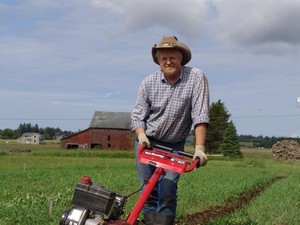06 Dec Sun 2009
ATTRA Video on Small Grain Production
- The economics and marketing of crops
- The importance of soil health and minimal tillage
- Fertility management and acceptable organic nutrient sources
- Weed and pest management
- Transition tips
- Rotation design
This webinar was quite useful, both for some new ideas for me, as well as reinforcing things I am already doing. The importance of rotation in pest management was emphasized, as well as the paradigm of "feeding the soil." I get so tired of even organic farmers who only look at feeding the current crop without looking at the long-range effects on your soil of each year's rotation, fertilizers, tillage, etc. Duane was clearly committed to caring for his land over the long haul and building up his soil. He also corroborated my idea of not getting outside manures without knowing the farmer and his/her management practices. Both Duane and Susan are big on integrating animals as part of the long-term soil stewardship process, a point I personally disagree with, but which most sustainable farmers have come to accept.
On this note about manures and the attendant meat/dairy/egg production, certainly we need to cut our meat consumption in this country, but banning CAFO's (confined animal feedlot operations) would be sufficient. This would drop meat consumption in the US by about 90% or more at first, but it would make small-farm meat production more viable. The rationale for banning CAFO's is more about keeping groundwater clean and stopping the spread of E. coli O157:H7 than about animal rights issues, even though animal welfare is considerably better on small farms than CAFO's. The vegans and vegetarians I know don't advocate everyone totally dropping meat consumption, but rather cutting it down to a smaller amount overall. On our farm, we buy a quarter of beef every other year from a local grower and it is actually cheaper than what we could buy in the grocery store, besides being more healthful.
Back to the grain growing. The webinar was totally oriented towards machine agriculture and making a living in the modern business climate. Consequently, organic production is emphasized for the price premium available once you are certified. I was able to get a question in about shifting to more human labor and away from machines, but neither Duane nor Susan got the drift of my question - mostly because the moderator rephrased it. Small plots, hand harvesting, threshing by hand or by electric chippers, winnowing with fans and in the wind - all of these are still under the radar. Yet the emphasis on soil stewardship was quite evident throughout. BTW "small grains" are usually defined as the cool-season grasses, like wheat, rye and spelt, but the term also includes buckwheat.
If you are interested in viewing this webinar, it is archived and runs 1 hour 31 minutes. Here is the link. http://www.attra.ncat.org/video/

